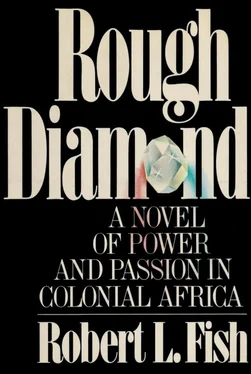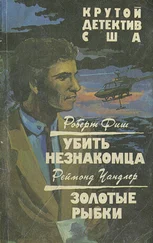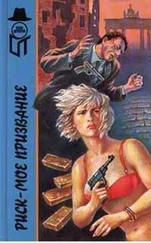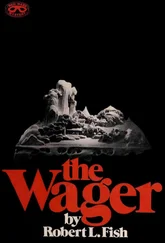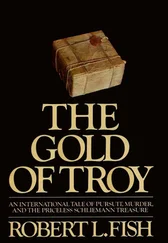On the other hand it undoubtedly would be an honor to run for the Assembly and to be elected; he was sure Fay would enjoy the time spent in a civilized town like Cape Town during the Assembly sessions as a welcome respite from the dirt and filth of the growing Johannesburg; besides, it would be near her hometown of Simonstown and would give her a chance to see old friends. And it would be good to have an excuse to get back to Kimberley again for the campaigning, and to meet old friends and see the old familiar sights. Oh, there would be advantages, there was no doubt of that, not the least being that he would be able to tell these hot-tempered idiots just how foolish they were.
But on the other hand, Fay was close to her time, and was in no condition to be traveling anywhere, not even to Kimberley and not even in the most comfortable means of travel; the roads and carriages of the day were not for women in labor. And it would be unfair for him to be away when the baby was born. Unfair? It would be unthinkable, especially after they had waited so many years for this baby. And, without being crass, he had just spent over two million pounds of his Barnato Investment Company’s money, and while a good part of it was his own money, at the same time the stockholders were entitled to his close attention to sums that great. And he also had a responsibility to his family and the unborn baby to see that the Barnato fortune was not treated cavalierly through what would, at the moment, merely represent a form of vanity on his part. Solly was a capable assistant, Barney knew that, but he strongly suspected that it was precisely people like Solly and Cecil Rhodes that Breedon had been referring to as wishing to foster trouble between the Boers and the English. And, to be truthful, the best place to be to keep an eye on Solly and the other members of the so-called Reform Committee was in Johannesburg and the Rand Club, not in Cape Town.
In some ways it was a hard decision, but basically it was an easy one. Barney swung back to his guest.
“Mr. Breedon,” he said earnestly, “I appreciate your coming to see me, and I’m flattered you wish me to run for a seat in the Assembly. But this isn’t the time, at least not for me. In two or three years, when the next election takes place, possibly. But not now.”
Breedon sighed and came to his feet. He was a pragmatist, a man who recognized the futility of an argument with a man of Barnato’s caliber once his mind had been made up.
“Then it is possible that I shall be back in two or three years, if it is not too late by then,” he said, and smiled. “Newspapermen are notoriously patient; after all, we have no choice. We must wait each day for something to happen to give us our headlines and our columns. Impatience doesn’t help.” He held out his hand; Barney came to his feet and gripped it strongly. “Newspapermen can also be helpful at times,” Breedon added quietly. “If there is ever anything I can do…”
Barney grinned, his old gamin grin. “As a matter of fact, there is,” he said. “That young chap who was in here before you is my nephew. I’d appreciate it if you could tell him, on your way out, to send in the next one…”
In a suburb of Glasgow, in a small laboratory behind the surgery of two brothers who were doctors, three men labored, the third being a self-taught chemist. The three had been intrigued for a long time with the problem of extracting the last grain of gold from the ore-bearing rock. Not only would the solution to the age-old problem make them rich and famous — and permit them, possibly, to mount a decent laboratory instead of the poor one in which they worked — but it would have a profound effect on the economy of many countries, and principally South Africa and the gold Reef of the Rand.
Up until that time the major method of extracting nonalluvial gold — gold that was not found in a free state, washed down some river from a mother lode above — was through the mercury process. Here mercury was used to form an amalgam with the precious metal once the rock containing it had been crushed; the mercury was then boiled off and condensed for reuse. But the amalgam process recovered at most 50 per cent of the precious gold, and since the Johannesburg Reef contained on an average approximately between one half and one ounce of gold per ton of rock, even a 50 per cent recovery rate — as Solly Loeb had pointed out — was barely profitable considering the huge expenses involved in equipment and labor. The addition of the chlorination process, as installed at the Robinson mine, had raised the recovery rate from 50 per cent to between 65 and 70 per cent, but the additional cost involved made the increased recovery little more profitable than the original amalgam process. The challenge of knowing that the largest deposit of gold-bearing rock in the world, practically an underground mountain of gold, would soon be merely an oddity, a curiosity, its riches forever locked away from mankind merely because of the economics of recovery, drove the three men to work hard to find a proper solution to the problem.
“If the rock could be crushed fine enough,” said one of the doctor brothers one day — his name was William Forrest — “then it seems logical that the gold could be combined with another element, a cheap-enough and recoverable-enough element to make the process worthwhile. In that combination we might be able to precipitate the gold in some fashion.”
“The fineness of the crushing should be no great problem,” said his brother, Robert Forrest. Robert, while weaker in chemistry than the others, was by far the most mechanically minded. “Some of the big presses down at the John Brown Shipyards along the Clyde can bend and form a four-inch-thick steel plate; they certainly ought to be able to crush rock. And if we want it any finer, we can use the type of ball mills they use for pigments, and some of them, like the phthalocyanine greens and blues, are pretty hard,” he added with conviction. “We can get the rock to as fine a powder as we wish. The only thing is, combining crushed rock with another element is basically what the mercury amalgam process does. And the recovery is barely half.”
“I don’t mean mercury,” William said, irritated at his brother’s intransigence. “I mean something more effective!”
“Like what?” Robert asked innocently.
The three of them laughed. They were having lunch at a small pub not far from their laboratory in the industrial section of Rutherglen. John Stewart MacArthur, the third of the group and the self-taught chemist, had learned his profession at a company that specialized in the treatment of refractory minerals from all over the world. With a sudden faraway look in his eyes, he bit into his meat pie, chewed, swallowed, and washed the entire bit down with a draft of his beer.
“Speaking of the phthalocyanine blues and greens,” he said, setting down his stein, “Farraday experimented with sodium cyanide in an exhibition at the Albert Hall almost twenty-five years ago, showing it had an extraordinary affinity for gold.”
“But it was never proven as being practical on an industrial scale,” Will said. “I know what you mean. There was a Julio Rae who even got a patent in America on treating either gold or silver ores with potassium or sodium cyanide, but nothing ever came of that, either.”
“Maybe they didn’t go far enough,” MacArthur said. He pushed aside his meat-pie dish and was wiping the table dry before applying his pencil to it. A horrified serving maid hurried up, sliding a piece of paper under his pencil before he could mar the polished surface of the wood; apparently the staff of the pub were accustomed to Mr. MacArthur and his habits, and were prepared for them.
“Really, Mr. MacArthur!”
Читать дальше
